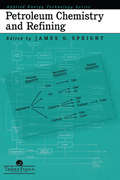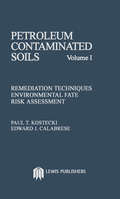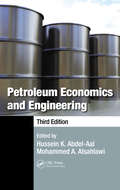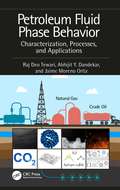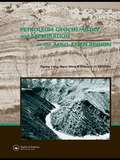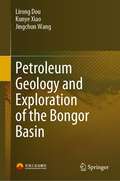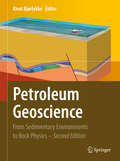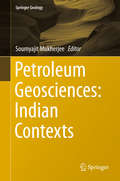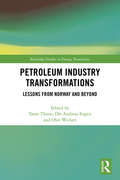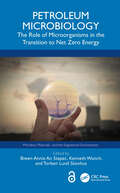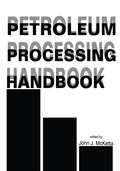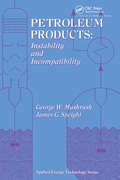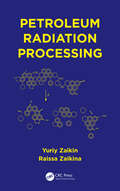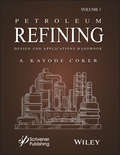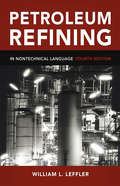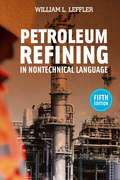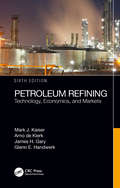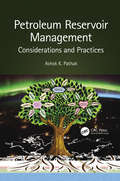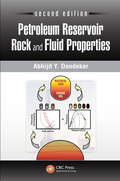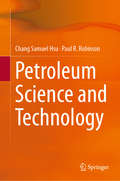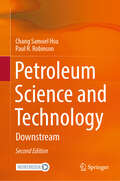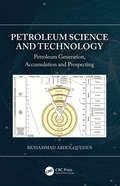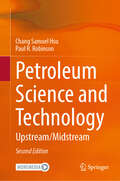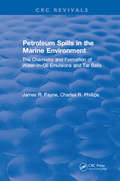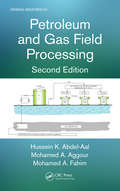- Table View
- List View
Petroleum Chemistry And Refining
by James G. SpeightSupported by numerous illustrations and references, this book describes the chemistry and physics that occur during the refinery operations, and how the properties of petroleum can be translated into predictability in refinery scenarios. The chapters discuss such topics as: the composition of petroleum, petroleum analysis and evaluation; metals and
Petroleum Contaminated Soils, Volume I: Remediation Techniques, Environmental Fate, and Risk Assessment
by Paul T. KosteckiThese three volumes provide valuable information to help bring rational and scientifically feasible solutions to petroleum contaminated soils. State-of-the-art information on both technical and regulatory issues is covered, including environmental fate, health effects, risk assessment and remedial alternatives. They show why petroleum contaminated soils are a problem - and propose solutions for that problem. These books are an excellent reference for regulatory personnel and environmental consultants at all levels.
Petroleum Economics and Engineering
by Mohammed A. Alsahlawi Hussein K. Abdel-AalThis book explains how to apply economic analysis to the evaluation of engineering challenges in the petroleum industry. Discussion progresses from an introduction to the industry, through principles and techniques of engineering economics, to the application of economic methods. Packed with real-world examples and case studies demonstrating how to
Petroleum Fluid Phase Behavior: Characterization, Processes, and Applications (Emerging Trends and Technologies in Petroleum Engineering)
by Abhijit Y. Dandekar Raj Deo Tewari Jaime Moreno OrtizThis book deals with complex fluid characterization of oil and gas reservoirs, emphasizing the importance of PVT parameters for practical application in reservoir simulation and management. It covers modeling of PVT parameters, QA/QC of PVT data from lab studies, EOS modeling, PVT simulation and compositional grading and variation. It describes generation of data for reservoir engineering calculations in view of limited and unreliable data and techniques like downhole fluid analysis and photophysics of reservoir fluids. It discusses behavior of unconventional reservoirs, particularly for difficult resources like shale gas, shale oil, coalbed methane, reservoirs, heavy and extra heavy oils.
Petroleum Geochemistry and Exploration in the Afro-Asian Region: Proceedings of the 6th AAAPG International Conference, Beijing, China, 12-14 October 2004
by Digang Liang Darui Wang Zhenxi LiPetroleum Geochemistry and Exploration in the Afro-Asian Region includes 29 papers presented at the 6th International Conference on Petroleum Geochemistry and Exploration in the Afro-Asian Region.Petroleum geochemistry has played a crucial role in determining effective source rocks, classifying petroleum systems and delineating the geneses of conve
Petroleum Geology and Exploration of the Bongor Basin
by Lirong Dou Kunye Xiao Jingchun WangThis book offers case study of the tridimensional exploration in whole exploration cycle with comprehensive and systematic geological and geophysical studies in the Bongor Basin. Focused on the typical intensively inversed rift basin—the Bongor Basin in Chad, this book establishes petroleum geology model, accumulation model of the typical intensively inversed rift basin and ensemble exploration techniques by studying comprehensively through the lens of structural geology, petrology, geochronology, sedimentology, paleontology, petroleum geochemistry, petroleum geology, and hydrocarbon accumulation dynamics studies on both granite buried hill and sandstone reservoir. Based on the cases in whole exploration cycle and abundant primary research resource (some are first published in public) in the Bongor Basin, this book is a valuable reference for researchers, managers, instructors, and students who engaged in petroleum exploration.
Petroleum Geoscience
by Knut BjørlykkeThis comprehensive textbook presents an overview of petroleum geoscience for geologists active in the petroleum industry, while also offering a useful guide for students interested in environmental geology, engineering geology and other aspects of sedimentary geology. In this second edition, new chapters have been added and others expanded, covering geophysical methods in general and electromagnetic exploration methods in particular, as well as reservoir modeling and production, unconventional resources and practical petroleum exploration.
Petroleum Geosciences: Indian Contexts
by Soumyajit MukherjeeThis book incorporates original and review articles on several aspects of petroleum geosciences from Indian terrains, both onshore and offshore, and includes diverse geological (tectonic, sedimentological, organic geochemical, paleontological, stratigraphic, modelling and various others) and geophysical methods, policy aspects, and the latest techniques for exploration, development and production.
Petroleum Industry Transformations: Lessons from Norway and Beyond (Routledge Studies in Energy Transitions)
by Taran Thune Ole Andreas Engen Olav WickenTaking the case of the Norwegian petroleum industry as its vantage point, the book discusses the question of industrial transformations in resource-based industries. The book presents new, empirically-based analyses of the development of the petroleum industry, with an emphasis on three ongoing transformation processes: Technological upgrading and innovation in upstream petroleum. Globalisation of the petroleum industry and suppliers’ experiences of entering foreign markets. Diversification into and out of petroleum – and the potential for new growth paths after oil. Drawing together a range of key thinkers in this field, this volume addresses the ways in which the petroleum industry and its supply industry has changed since the turn of the millennium. It provides recommendations for the development of resource economies in general and petroleum economies in particular. This book will be of great interest to students and scholars of energy policy and economics, natural resource management, innovation studies and the politics of the oil and gas sector.
Petroleum Microbiology: The Role of Microorganisms in the Transition to Net Zero Energy (Microbes, Materials, and the Engineered Environment)
by Torben Lund Skovhus Kenneth Wunch Biwen Annie An StepecIn the oil and gas industry, technologies have been developed to address microbial-related issues such as oil field souring, microbiologically influenced corrosion, biofouling, and targeted measures for risk assessment and mitigation. Microorganisms have also benefited the oil sector through microbial-enhanced oil recovery and bioremediation of petroleum-contaminated environments. However, during the current transitional phase in the oil and gas industry, the role of the microbiome within the current infrastructure and its potential impact on future systems remains an open question. Petroleum Microbiology: The Role of Microorganisms in the Transition to Net Zero Energy explores technological advances in applied microbiology in the oil and gas sector that can be utilized in its transition to renewable energy systems. • Provides insights on the potential of applying microbiological techniques in oil systems to pave the way to achieving net-zero energy.• Presents the major industrial problems caused by microbes and their beneficial activities from both fundamental and applied perspectives.• Covers such technologies as next-generation sequencing, sampling, and diagnostics.• Offers a solid foundation on the importance of microbes to key aspects of the energy industry.• Seeks to answer the question: what role will microorganisms play in the evolution of energy systems?Featuring chapters from interdisciplinary experts spanning academia and industry, this is an excellent reference for microbial ecologists, molecular biologists, operators, engineers, chemists, and academics involved in the oil and gas sector, working toward energy transition.The Open Access version of this book, available at http://www.taylorfrancis.com, has been made available under a Creative Commons [Attribution-Non Commercial-No Derivatives (CC-BY-NC-ND)] 4.0 license.
Petroleum Processing Handbook
by John J. McKettaA reference that details the pertinent chemical reactions and emphasizes the plant design and operations of petroleum processing procedures. The handbook is divided into four sections: products, refining, manufacturing processes, and treating processes. Wherever possible, shortcut methods of calcula
Petroleum Products: Instability And Incompatibility
by George MushrushThis book provides an overview of the chemical and physical concepts of instability and incompatibility of petroleum and liquid fuels. It helps the petroleum refinery personnel to handle liquid fuels from other sources as feedstocks for the refinery system.
Petroleum Radiation Processing
by Yuriy Zaikin Raissa ZaikinaThis book presents a summary of the research progress in the field of petroleum radiation processing, which has produced technology that offers effective and economic solutions for some pressing oil refining challenges. It provides a systematic description of the most important experiments on radiation cracking for different types of petroleum feedstock, including crude oils, heavy oil residues, and bitumen. The book provides a detailed introduction to radiation methods based on radiation-thermal and low-temperature cracking of hydrocarbons, emphasizing high-viscous oil feedstocks that are difficult to process by conventional methods.
Petroleum Refining Design and Applications Handbook: Designs And Applications Handbook
by A. Kayode CokerThere is a renaissance that is occurring in chemical and process engineering, and it is crucial for today’s scientists, engineers, technicians, and operators to stay current. With so many changes over the last few decades in equipment and processes, petroleum refining is almost a living document, constantly needing updating. With no new refineries being built, companies are spending their capital re-tooling and adding on to existing plants. Refineries are like small cities, today, as they grow bigger and bigger and more and more complex. A huge percentage of a refinery can be changed, literally, from year to year, to account for the type of crude being refined or to integrate new equipment or processes. This book is the most up-to-date and comprehensive coverage of the most significant and recent changes to petroleum refining, presenting the state-of-the-art to the engineer, scientist, or student. Useful as a textbook, this is also an excellent, handy go-to reference for the veteran engineer, a volume no chemical or process engineering library should be without. Written by one of the world’s foremost authorities, this book sets the standard for the industry and is an integral part of the petroleum refining renaissance. It is truly a must-have for any practicing engineer or student in this area.
Petroleum Refining in Nontechnical Language (Pennwell Nontechnical Ser.)
by William L. LefflerWilliam Leffler's Petroleum Refining in Nontechnical Language, Fourth Edition is designed to give the reader an overview of key refining topics by using relevant analogies, easy-to-understand graphs, formulas, and illustrations. New to this edition is important information on the nature of crude oil and raw materials and a comprehensive discussion on what sets crude oil and oil products price differentials. Also new is a chapter on lubricants as well as the latest technologies employed by refiners. Each chapter was carefully written in nontechnical language to give the reader a basic understanding of the refining industry. The book can be used for self-study, as a classroom textbook, or as a quick reference.
Petroleum Refining in Nontechnical Language (Pennwell Nontechnical Ser.)
by William L. LefflerFor 45 years, William Leffler's Petroleum Refining in Nontechnical Language has been the go-to best seller for anyone needing to know the fundamentals of refining. Each chapter was carefully written in nontechnical language to give the reader a basic understanding of the refining industry.
Petroleum Refining: Technology, Economics, and Markets, Sixth Edition
by James H. Gary Mark J. Kaiser Arno de Klerk Glenn E. HandwerkFor four decades, Petroleum Refining has guided thousands of readers toward a reliable understanding of the field, and through the years has become the standard text in many schools and universities around the world offering petroleum refining classes, for self-study, training, and as a reference for industry professionals. The sixth edition of this perennial bestseller continues in the tradition set by Jim Gary as the most modern and authoritative guide in the field. Updated and expanded to reflect new technologies, methods, and topics, the book includes new discussion on the business and economics of refining, cost estimation and complexity, crude origins and properties, fuel specifications, and updates on technology, process units, and catalysts. The first half of the book is written for a general audience to introduce the primary economic and market characteristics of the industry and to describe the inputs and outputs of refining. Most of this material is new to this edition and can be read independently or in parallel with the rest of the text. In the second half of the book, a technical review of the main process units of a refinery is provided, beginning with distillation and covering each of the primary conversion and treatment processes. Much of this material was reorganized, updated, and rewritten with greater emphasis on reaction chemistry and the role of catalysis in applications. Petroleum Refining: Technology, Economics, and Markets is a book written for users, the practitioners of refining, and all those who want to learn more about the field.
Petroleum Reservoir Management: Considerations and Practices
by PathakPetroleum reservoir management considerations and practices are deeply rooted in the optimization of development objectives, requisite investments, operational costs, and philosophy in addition to the dynamics of timely decision-making. Petroleum Reservoir Management: Considerations and Practices highlights the key reservoir management topics and issues that engage the attention of exploration and production companies over the life cycle of an oilfield. This is the only book to exclusively address petroleum reservoir management based on actual field development experience. It emphasizes the role of good project management, the value of a quantitative assessment of reservoir health, the importance of using good practices, and the need for true collaboration among various team players to maximize the benefits. The book expands the scope of reservoir management from field operations to boardroom discussions about capital financing to product pricing criteria, mechanisms, and strategies. FEATURES Reviews subsurface and surface management issues Discusses project and price management factors critical to the oil industry Describes macromanagement issues covering the reservoir life cycle from production to pricing Includes the role and significance of teamwork, open communication, and synergy in reservoir management This book is aimed at professionals and graduate students in petroleum and reservoir engineering, oil and gas companies, and environmental engineering.
Petroleum Reservoir Rock and Fluid Properties
by Abhijit Y. DandekarAccessible to anyone with an engineering background, this text reveals the importance of understanding rock and fluid properties in petroleum engineering. Along with new practice problems and detailed solved examples, this edition covers Stone II three-phase relative permeability model, unconventional oil and gas resources, low salinity water injection, saturated reservoirs and production trends of five reservoir fluids, impact of mud filtrate invasion and heavy organics on samples, and flow assurance problems due to solid components of petroleum. It also offers better plots for determining oil and water Corey exponents from relative permeability data.
Petroleum Science and Technology
by Chang Samuel Hsu Paul R. RobinsonAimed at students and professionals, this book covers every major aspect of petroleum: the origin of fossil hydrocarbons and their chemical/physical properties; discovering hydrocarbon reserves; recovering oil, gas, and bitumen; purifying gas; the chemical and physical characterization of crude oil; refining crudes into fuels and lubricants; and converting simple chemicals into solvents, polymers, fibers, rubbers, coatings, and myriad other products, including pharmaceuticals. Readers will learn how the industry operates, from "upstream" exploration and production, "midstream" transportation to "downstream" refining, and manufacturing of finished products. The book also contains unique chapters on midstream operations, learnings from major accidents, and safety/environmental laws and regulations. It builds on the authors' previous books and teaching material from a highly rated course that is taught at the Florida A&M University/Florida State University (USA).
Petroleum Science and Technology: Downstream
by Chang Samuel Hsu Paul R. RobinsonAimed at students and professionals, this book provides an overview of the science and technology of the downstream sector of the oil and gas industry. Topics include the refining of crude oil and other feedstocks – including renewables – into fuels and lubricants. They also describe the conversion of simple chemicals into solvents, polymers, fibers, rubbers, coatings, and myriad other products, including pharmaceuticals.In addition to drawing on the authors' previous books, it includes teaching material from several courses. These include workshops provided for top refining companies and a highly rated course taught at the Florida A&M University/Florida State University (USA).
Petroleum Science and Technology: Petroleum Generation, Accumulation and Prospecting
by Muhammad Abdul QuddusPetroleum Science and Technology: Petroleum Generation, Accumulation and Prospecting describes natural hydrocarbon geology along with applicable aspects of physics, chemistry, biology, environmental science, mathematics, and engineering/technology. It starts off with a brief coverage of the origin and evolution of the universe, petroleum origin and generation in subsurface condition, source rock, oil/gas migration path and reservoir rock. Geological, geophysical, and geochemical petroleum surveys are also included. This book covers both theory and applied information. Aimed at graduate students, researchers, and professionals in petroleum engineering and chemical engineering, it: Covers petroleum geology and technology including petroleum generation, migration, and reservoir formation Introduces the nature and formation of petroleum and its exploration Describes oil/gas prospecting using geophysico-chemical methods under subsurface condition Includes a detailed geochemical survey along with an analysis of kerogen and bitumen Explains petroleum migration and accumulation using two-dimensional graphs MA Quddus PhD, has served in the petroleum sector and R&D organization, both national and multinational, for more than 40 years and has worked in various capacities including in the laboratory, office, field, and plant, and has also engaged in teaching petroleum technology as a visiting professor for 17 years. He earned BSc (Hons) and MSc degrees along with a PhD with thesis titled "Oxidation of Asphalt." As a result of his constant research, he has published nine international and 12 national papers, obtained one patent, presented five papers in conferences and prepared six technical reports. He has also visited the USA, Canada, and Indonesia for short courses in petroleum technology and teacher training.
Petroleum Science and Technology: Upstream / Midstream
by Chang Samuel Hsu Paul R. RobinsonAimed at students and professionals, this book provides an overview of the science and technology of the upstream/midstream sectors of the oil and gas industry. Topics include the origin of fossil hydrocarbons and their chemical/physical properties; discovering hydrocarbon reserves; recovering oil, gas and bitumen; and purifying natural gas and process offgas. The chapter on safety and the environment convers safety regulations and environmental laws. It highlights learnings from major accidents. In addition to drawing on the authors' previous books, it includes teaching material from several courses. These include workshops provided for top petroleum companies and a highly rated course taught at the Florida A&M University/Florida State University (USA).
Petroleum Spills in the Marine Environment: The Chemistry and Formation of Water-In-Oil Emulsions and Tar Balls
by James R. PayneThis book covers research completed between 1981 and May 1985 and includes: reviews of recent studies, sitings and investigations at spills-of-opportunity as well as results of recent arctic and sub-Arctic oil weathering experiments and observations on the behavior of crude oil in the presence of ice. Topics covered include the following: laboratory studies of formation and stability of water-in-oil emulsions; selected case histories of the more detailed chemistry studies of mousse behavior and long term fate in near-coastal and open ocean oil spills/blowouts; tar ball formation and distribution; and algorithms and computer programs to simulate the formation of water-in-oil emulsion.
Petroleum and Gas Field Processing (ISSN)
by Hussein K. Abdel-Aal Mohamed A. Aggour Mohamed A. FahimMany oil production processes present a significant challenge to the oil and gas field processing facilities and equipment design. The optimization of the sequential operations of handling the oil–gas mixture can be a major factor in increasing oil and gas production rates and reducing operating costs.Petroleum and Gas Field Processing provides an all-inclusive guide to surface petroleum operations and solves these and other problems encountered in the field processing of oil and gas. Fully revised and updated to reflect major changes over the past decade or so, this second edition builds on the success attained in the first edition. It delivers an expanded and updated treatment that covers the principles and procedures related to the processing of reservoir fluids for the separation, handling, treatment, and production of quality petroleum oil and gas products.With five new chapters, this second edition covers additional subjects, in particular natural gas, economics and profitability, oil field chemicals, and piping and pumps. The book also contains worked-out examples and case studies from a variety of oil field operations.
